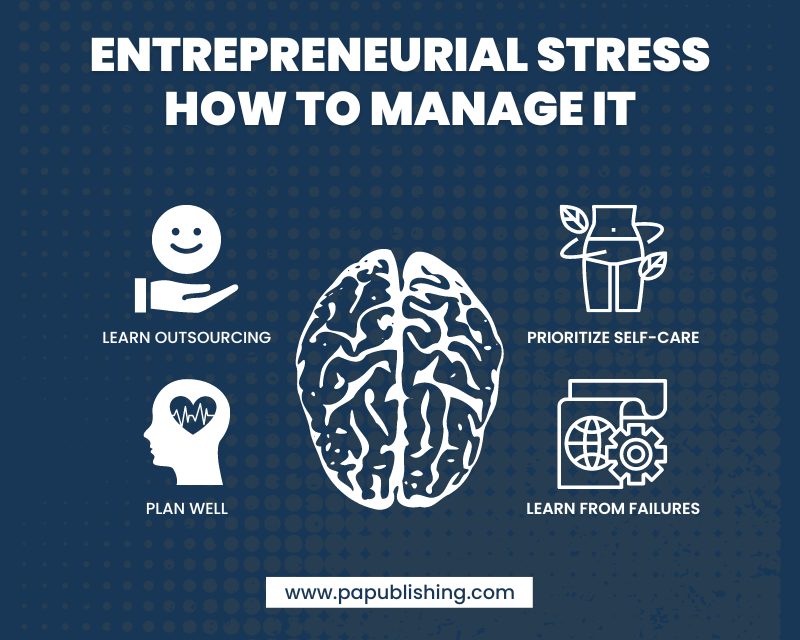What is Entrepreneurial Stress? How to Deal with It in 2023?
Entrepreneurship is often glamorized in our society as a pathway to freedom, success, and wealth. However, behind the success stories and the headlines, the reality of being an entrepreneur is far more complex than this idealized version. Starting a new business is an interesting endeavor, but it also comes with challenges that lead to entrepreneurial stress.
Gallup shows that 45% of the entrepreneurs reported being stressed compared to other workers in the poll. This stress can take many forms, including financial worries, long hours, and constant pressure to succeed. All of these challenges can take a toll on an individual’s mental and physical well-being if not managed properly.
Types of Entrepreneurial Stress
Financial Stress
This is one of the common types of entrepreneurial stress. It is the stress that comes from managing finances, including managing cash flow, paying bills, and seeking funding. This can create a lot of pressure, especially in the early stages of a business when revenue may be limited.
Time Management Stress
Entrepreneurs often have to juggle multiple responsibilities, including managing the business, marketing, sales, customer service, and more. This can lead to stress related to time management, especially if the entrepreneur is working long hours and struggling to balance work and personal life.
Decision-Making Stress
Another type of entrepreneurial stress is related to decision-making. Entrepreneurs often have to make tough decisions, such as hiring employees, choosing suppliers, and deciding which projects to pursue. The pressure of making prudent decisions can cause stress and anxiety.
Workload and Burnout Stress
A startup mentor often has to wear multiple hats and do everything themselves. This can lead to stress related to workload, especially if the entrepreneur is trying to do too much and not delegating tasks to others. This workload can lead to burnout, exhaustion, and stress-related health problems. Research shows that 72% of entrepreneurs are directly or indirectly affected by mental health issues.
Networking Stress
Networking is essential to entrepreneurship but can also be stressful for some entrepreneurs. They may feel uncomfortable or nervous in social situations, struggle to build relationships with potential investors or partners, or struggle to navigate the business world’s social norms.
Uncertainty Stress
Starting a business involves a lot of unknowns, including market fluctuations, customer preferences, and regulatory changes. This uncertainty can create anxiety and entrepreneurial stress.
Causes of Entrepreneurial Stress
Limited Capital
One of the biggest causes of entrepreneurial stress is financial pressure. It can be due to a lack of funding, difficulty securing investments or loans, or concerns about cash flow.
Managing People
As businesses grow, entrepreneurs may need to manage employees, which can be challenging and stressful. Hiring, training, and retaining staff can be a significant source of stress.
Fear of Failure
Entrepreneurs invest a lot of time, money, and energy into their businesses, and the fear of failure can be a significant source of stress. The pressure to succeed can create anxiety and stress, particularly when facing setbacks or challenges.
Competition
Business starters face competition from established businesses and other startups, which can create pressure to innovate and differentiate themselves. This pressure can create stress related to product development, marketing, and pricing.
How to manage Entrepreneurial Stress?
Entrepreneur stress management is significant to maintain a healthy work-life balance. Here are some strategies to optimize your business stress.
- Creating a solid business plan can help entrepreneurs manage financial stress and uncertainty. This assists you to make informed decisions and avoid making impulsive choices.
- Delegate the tasks to employees or outsource work adequately. It keeps your focus on high-priority tasks and avoids feeling overwhelmed.
- Prioritize your self-care. This may include limiting work hours, setting clear expectations with clients or employees, and taking regular breaks. Entrepreneurs need to prioritize self-care and take time off to recharge.
- Embrace impediments and failures as opportunities to learn and improve your entrepreneurial mindset. It can help entrepreneurs manage their fear of failure and maintain a positive attitude.
Conclusion
In short, entrepreneurial stress is a common and challenging experience for many entrepreneurs. Managing stress is essential to maintain good mental and physical health, making sound decisions, and leading effectively. So, it’s significant to adopt a proactive approach to stress management to achieve long-term goals.

